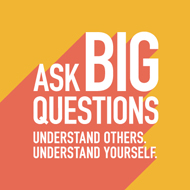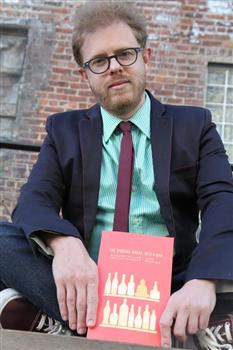Join a community of readers who are committed to Jewish stories
Sign up for JBC’s Nu Reads, a curated selection of Jewish books delivered straight to your door!
 The Jewish Book Council is delighted to launch a new blog series in partnership with Ask Big Questions, an initiative out of Hillel International aimed at getting people to talk about issues of heart, soul and community. Each month, Ask Big Questions will feature a JBC author on their blog, shared here on the JBC ProsenPeople blog page, and in campus programming reaching over 10,000 college and graduate students.
The Jewish Book Council is delighted to launch a new blog series in partnership with Ask Big Questions, an initiative out of Hillel International aimed at getting people to talk about issues of heart, soul and community. Each month, Ask Big Questions will feature a JBC author on their blog, shared here on the JBC ProsenPeople blog page, and in campus programming reaching over 10,000 college and graduate students.
Lodro Rinzler is a 2013 – 2014 JBC Network author and a contributing columnist for such publications as The Huffington Post and Marie Claire. The former director of the Boston Shambhala Center, Rinzler teaches and lectures throughout North America.
Technology is a tool, like a hammer. You can use a hammer in a positive way, placing a nail in a wall and hanging beautiful art, or in a negative way, bashing someone’s head in. The hammer itself is not good or bad, it is our intention in using it that makes it so. The same can be said for technology.
Connecting to others through technology can be an overwhelmingly positive thing. Take, for example, protestors tweeting injustices half a world away, such that news channels can follow up in order to receive on-the-ground updates. I teach meditation classes, and thanks to video sharing technology, I can offer that tool for peace and presence to thousands of people I would not have access to if I was limited to meeting with everyone in-person. Perhaps more poignantly, I recently wrote an article for the Huffington Post detailing my experience with depression and suicide that went viral, leading to many many people sharing their own stories and finding support in appropriate channels.
On the flip side, technology can be used in a hurtful manner. Take the new ways of cyber-bullying that we did not have to deal with a generation ago. Rumors have always been around but now we can propagate them anonymously and in ways that millions can read. Plus, the Internet never sleeps so we can procrastinate nonstop. Whether it’s Wikipedia, Facebook, or online shopping, we all have some way that we prefer to avoid our work or our present reality.
 In my work as a meditation teacher I always begin by asking people what their intention is for meditating. Meditation is hard and people tend to get disheartened unless they are very clear about why they want to do it. And I’m a firm believer that in all of our activity we always have either a conscious or unconscious intention. One leads us to a joyful existence, the other leads to trouble.
In my work as a meditation teacher I always begin by asking people what their intention is for meditating. Meditation is hard and people tend to get disheartened unless they are very clear about why they want to do it. And I’m a firm believer that in all of our activity we always have either a conscious or unconscious intention. One leads us to a joyful existence, the other leads to trouble.
I’ll give you an example. You might want to go out with friends on a Saturday night. Also, you might drink, and likely dance and/or talk to members of the sex you’re attracted to and maybe even make out or something. That’s cool. Really. I’m all for it, if you consciously intend to do those things, after actual reflection.
More often than not we go out with friends, launch into a new relationship, or jump ship from one job to another without a clear understanding of why we’re doing what we’re doing. We never pause and develop a conscious intention and, as a result, things tend to get messy down the road.
To return to our example you could have had a rough week and you go out straight from work. No time to pause and reflect, and try to live with a conscious intention. So you drink too much to forget the jerks you work with, then because you drink too much you end up tripping over yourself while dancing, making a fool of yourself around people you want to make out with, and continue to drink to avoid dealing with any of these rough emotions. You end up sick and regretting the whole experience.
Let’s step back and do the same scenario but with a conscious intention. You leave work but you decide to take a respite first. You go for a walk or sit in a park. You take some time and reflect on your job, allow for the transition from work to fun happen, and then contemplate, “What is my intention for tonight?” After a few minutes of returning to that question you realize that you just want to connect with the friends you’re going to see because you don’t get to see them enough. You head out and instead of getting wasted you enjoy a few drinks with them, relax together, and reconnect. Whether you dance or meet other people or not it’s all okay because you’re living in line with your conscious intention.
When you live your life in line with conscious intentions, as opposed to unconscious ones, you live a happier, more connected life overall. To return to our discussion about technology, you can catch yourself when you’re about to click tabs over to spend some time on Facebook and ask yourself, “What’s my intention here?” Have you been meaning to check out photos of your friend’s wedding? Or are you just looking to mindlessly distract yourself? The more we ask ourselves why we do what we do, the more we can put technology to use in ways that help us make a positive difference in the world.
If we can learn to be very conscious with our intention about why and how we engage our technology, as well as the rest of our life, the ramifications are infinite.
Lodro Rinzler is the author of the bestselling The Buddha Walks into a Bar …, the award-winning Walk Like a Buddha, and the new books The Buddha Walks into the Office: A Guide to Livelihood for a New Generation and Sit Like a Buddha: A Pocket Guide to Meditation. His columns appear regularly in The Huffington Post and Marie Claire, and he has been featured in numerous publications, including Bloomberg Businessweek, Real Simple, Tricycle and the Shambhala Sun. He is the founder of the Institute for Compassionate Leadership, a leadership training and job placement organization.